Reading Group Guide
Discussion Questions
Native Son

1. Wright writes of Bigger Thomas: "These were the rhythms of his life: indifference and violence; periods of abstract brooding and periods of intense desire; moments of silence and moments of anger--like water ebbing and flowing from the tug of a far-away, invisible force." Does Wright intend us to relate to Bigger as a human being--or has he deliberately made him an unconscious embodiment of oppressive social and political forces? Is there anything admirable about Bigger? Does he change by the end of the book?
2. James Baldwin, an early protege of Wright's, later attacked the older writer for his self-righteousness and reliance on stereotypes, especially in the character of Bigger. In his famous essay "Everybody's Protest Novel," Baldwin compared Bigger to Harriet Beecher Stowe's Uncle Tom and dismissed Native Son as "protest" fiction with a naked and simplistic political agenda. Do you agree?
3. When Bigger stands confronted with his family in jail, he thinks to himself that they ought to be glad that he was a murderer: "Had he not taken fully upon himself the crime of being black?" Talk about Bigger as a victim and sacrificial figure. If Wright wanted us to pity Bigger, why did he portray him as so brutal?
4. Bigger repeatedly says to himself that the accidental killing holds "the hidden meaning of his life": "He had murdered and had created a new life for himself. It was something that was all his own, and it was the first time in his life he had anything that others could not take from him." Discuss the disturbing concept of killing as a "supreme and meaningful act." Is this Wright's own view of the killing--or are we meant to see it only as Bigger's internal conclusion?
5. When first confronted with the accusation that he raped Mary, Bigger thinks: "rape was not what one did to women. Rape was what one felt when one's back was against a wall and one had to strike out." Discuss the group's reactions to this controversial passage. Does this redefinition of rape reveal an insensitivity on Wright's part to women and the oppressions that they experience in American society? 6. How dated does this book seem in its depiction of racial hatred and guilt? Have we as a society moved beyond the rage and hostility that Wright depicts between blacks and whites? Or are we still living in a culture that could produce a figure like Bigger Thomas?
Native Son
- Publication Date: September 1, 1998
- Genres: Fiction
- Paperback: 528 pages
- Publisher: Harper Perennial
- ISBN-10: 0060929804
- ISBN-13: 9780060929800








